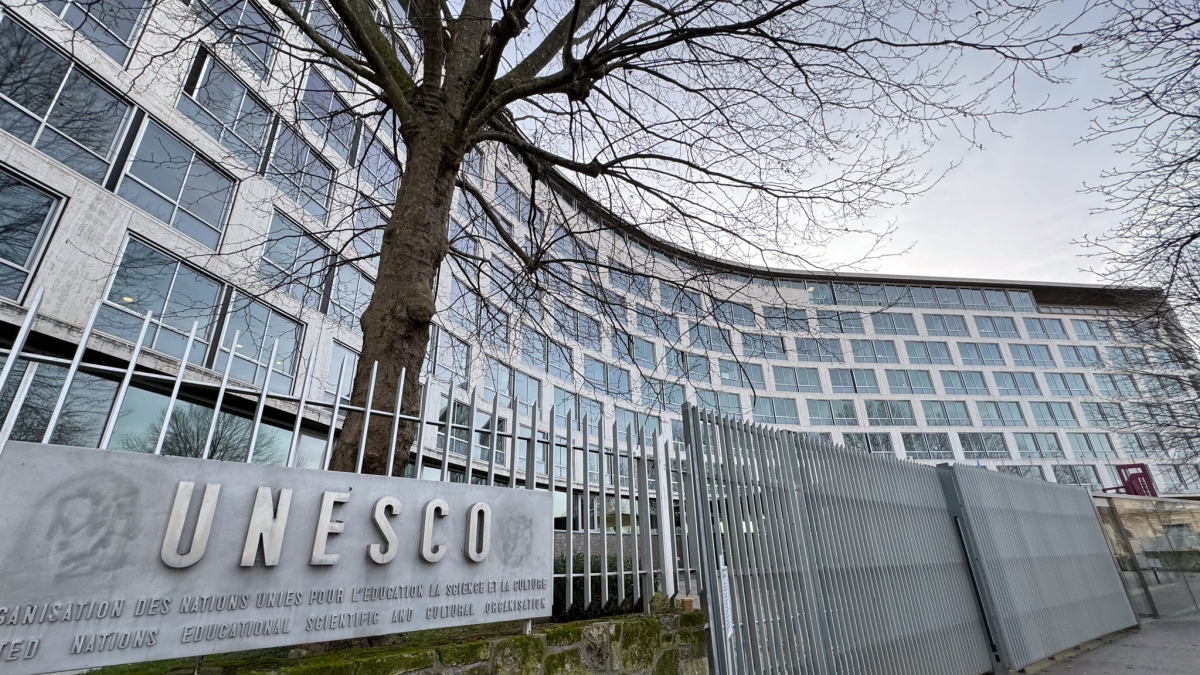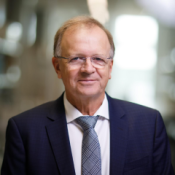ASU scientist to serve on UNESCO sustainability coalition council

BRIDGES, a U.N.-based sustainability coalition, is set to hold the inaugural convening of its permanent governing council at UNESCO headquarters later this summer. Included among the recently announced members on the governing council is Peter Schlosser, vice president and vice provost of Global Futures at ASU. Courtesy photo
When the U.N.-based sustainability coalition BRIDGES launched in 2021, its aim was to organize some of the world’s most innovative minds to consider humanities-based solutions that address global challenges.
With the adoption of BRIDGES’ Terms of Reference, signed into effect in Paris in January, the global coalition now enters into its longer-term phase: co-producing knowledge and actions that support the United Nations’ 17 Sustainable Development Goals (SDGs), the Paris Agreement on Climate Change and the Convention on Biodiversity, among other international initiatives.
Toward that end, BRIDGES, part of the United Nations Educational, Scientific and Cultural Organization’s (UNESCO’s) Management of Social Transformations (MOST) Programme, is set to hold the inaugural convening of its permanent governing council at UNESCO headquarters later this summer.
Included among the recently announced members on the governing council is Peter Schlosser, vice president and vice provost of Global Futures at ASU. Schlosser is one of 12 members from an array of backgrounds who will steer the coalition’s efforts.
He will be joined by chair of the council Gabriela Ramos, assistant director-general for the social and human sciences at UNESCO, in addition to the presidents of the International Council for Philosophy and Human Sciences, Humanities for the Environment, the MOST Intergovernmental Council and the International Science Council, among other notable leaders in the humanities, sciences and policy spaces.
“Since 2022, the Julie Ann Wrigley Global Futures Laboratory has proudly served as the lead institutional and scientific partner of the ASU BRIDGES Flagship Hub,” Schlosser said. “During this exciting new evolution, the ASU Flagship Hub will assume a more central role providing intellectual leadership to the BRIDGES coalition, its 40-plus member institutions, its growing number of international hubs and the intergovernmental Management of Social Transformations Programme.”
While six hubs including ASU currently exist, BRIDGES Founding Executive Director Steven Hartman said the network of international hubs is expected to significantly increase in the coalition’s next three-year phase of activity. Hartman said hubs in Asia, the Pacific, South America and the Middle East are anticipated to join those currently based in North America, Europe and Africa.
“ASU is a nationally prominent and world-leading institution in the sustainability domain,” Hartman said. “The considerable expertise and intellectual resources available at ASU make the Global Futures Laboratory the logical choice for the home of the BRIDGES Flagship Hub, which plays a lead role in advancing the work of the coalition through its cohesive network of hubs.”
The growing network of international hubs enables the implementation of the BRIDGES coalition as a global force linking the humanities with social and natural sciences, the arts, educational sciences and traditional knowledge communities. As the number of hubs grow, so too will the coalition’s ambitions. Hartman said the creation of the governing council will further strengthen BRIDGES’ focus on promoting new transdisciplinary projects around the world.
One such project funded this year by the Belmont Forum, “Coastal TALES,” links ASU with Trinity College Dublin and University of Wales Trinity Saint David, exploring heritage as a tool for community resilience in vulnerable environments and places facing impacts from climate change. Projects like these, Hartman said, exemplify BRIDGES’ positioning of the humanities and local and Indigenous knowledge communities at the center of sustainability science.
These points were reinforced by President’s Professor Joni Adamson, founding director of the BRIDGES Flagship Hub at ASU.
“This newly established council will play a major role as the ultimate decision-making body steering the BRIDGES coalition as the first international initiative in the U.N. system integrating the humanities in a more comprehensive approach to sustainability research, education and action,” Adamson said. “As a leading scientist in his field and the head of the Global Futures Laboratory at ASU, we are very encouraged to see UNESCO welcome Peter Schlosser to the BRIDGES Governing Council.”
More Environment and sustainability

ASU President Michael Crow named to TIME100 Climate list
Arizona State University President Michael Crow has been named to the 2024 TIME100 Climate list of leaders and innovators driving real climate action.The list includes leaders across a range of…

Driving green desalination
Wilderness survival TV show hosts, pirates and water treatment researchers agree on one thing: Most natural water sources are not safe for drinking. Among the many potential risks is the high salt…

ASU preservation facility serves as test bed for rooftop heat mitigation
A roof coating that uses thermal energy storage materials from Arizona State University spinout EnKoat is halting the heat in several ASU buildings — including a section of the university’s largest…
